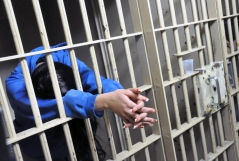
I don't come from a craft kinda family. Saturdays were for football and visiting Grandma and Spaghetti Napoli. But a few times a year, we volunteered in mammoth handmade miniature expressions of love on Saturdays. It involved hundreds of oranges and cocktail sticks at Christmas and at this time of year fir-sap coated fingers matched foliage with daffodils for Mother's Day. I grew up in a church of several hundred people and on Mothering Sunday, first the mothers then the other women, all received the mini bouquets we'd assembled the previous day. I loved giving flowers to my Mum, my Grandma, to Christine. I loved it when I was deemed old enough to receive a mini-bouquet myself. I loved my Mum and this was part of a rolling seasonal arrangement of opportunities to tell her so.
In the aftermath of leaving university, a dear friend's mother became very ill. Her life unravelled over the next 18 months and my 25-year-old friend suddenly didn't have a Mummy. She no longer had the person that had made the world a less frightening place for her. It was devastating. I started going to a church where a new friend had suffered repeated miscarriages, then had a baby very prematurely, who only lived for five months. Mother's Day got a bit more complicated. I started to volunteer with a counselling charity, listening to women who had encountered difficulty following terminating a pregnancy. My heart cracked as the woman in front of me talked about avoiding her church on Mother's Day; she felt judged and ashamed because she had not chosen motherhood.
Another friend confided in me, "It takes me hours to find a Mother's Day card. I find my mother so difficult and I don't want to send her a card that says things on it I don't mean. She isn't my best friend – she does my head in." Mother's Day was a struggle for her, she felt guilt and shame particularly acutely about their relationship on this day – was she a bad daughter? It she'd tried a bit harder could it all have been sunshine and mini bouquets? Her uncomfortable questions and difficult feelings were often exacerbated by the celebration of conventional motherhood the church revelled in on this day.
In my mid 20s I was diagnosed with a gynaecological problem, endometriosis. I had two lots of surgery – in February and in May – to deal with it. Between the surgeries I had anti-hormone injections that induced a mini menopause, replete with hot flushes. Between the surgeries fell Mother's Day and at my church that year we had a baptism that day. At a time where there was a huge question mark over my fertility and my ability to ever have my own biological child, a day where we celebrated biological mothers and one specific child felt unbearable. I knew my attitude wasn't great and that I was having a disproportionate reaction. I managed to stay sitting in that church but was in agony, feeling sick and hardly able to control my tears. I was angry that I may never be a mother and for other people it seemed as easy as falling off a log. I was inconsolable for the rest of the day and disentangling all the emotions and thoughts magnified by that church service took many months, perhaps years.

Then I began working in prison. I worked with women who had had their children forcibly removed. There aren't really words for the kind of hole that leaves, for the depth of pain that creates, for the self-harming, suicide-inducing torment experienced by a woman separated – often permanently – from their child. I went on to do a job working with young women leaving prison. None of those women had a good relationship with their mothers, if they were in contact at all. Many of them had been in care; their mothers were addicts, their mothers had abused them or prostituted them or been their co-defendant: their mothers had been unable to sufficiently care for them in every single case. The idea of Mother's Day was salt in the wound of being unparented, unloved and without secure childhood attachment. Tragically, some of their children had also been taken into care and permanently removed from them.
This is what finally cemented my dislike of this day. The tawdry, terrible rhyming couplets; the saccharine, shiny satin bows – just empty trinkets for the card and gift industry to increase their profits by while ratcheting up the pain of anyone who has an even vaguely complex relationship with their mothers or children. Mothering Sunday – if we celebrate it at all – has got to be more than hearts and flowers. If we believe in a God of love and freedom, all of us in church need to think carefully about how we communicate that for everyone on this, the most sensitive of days. God certainly is a good parent to us, a brilliant mother, but when our experience of parenting is less than good, how do we bridge that gap?
On a day that celebrates biology, how do we thank all the women, all the people in our lives who have undertaken to mother us? As church leaders preparing for Mother's Day, take a moment to think about whether – in the midst of giving thanks – the things that you say might hold an unintended sting for those whose motherhood status isn't as they wish. Motherhood is a gift and it certainly isn't the only contribution women make to society, Church, life – take care not to conflate the two and condemn women who aren't mothers. Don't reduce Godly womanhood to mothering. Find ways to complement, compliment and celebrate all those who mother, who parent, who care, who fight, protect and shield those in need of safe harbour and nurturing. Be mindful that we don't get to choose our earthly parents and we may not have chosen our parenting status either. Mother's Day has profound and powerful potential but not if we are hung up on biology alone.
This Sunday, I will show my Mummy that I love her. I will show my church aunties that they are my London Mummys and I am immeasurably blessed by all these. But I'll also have a little cry for all those who long to be a mother but aren't, for those who miss their mother, for those who have been immeasurably hurt by theirs and for those who are separated from the ones they bore. God holds us together, reconciles us and can heal us from every trauma. God chooses to work through his people. Let's look to bring reconciliation and healing this Mother's Day.
Sara Hyde worked for seven years in frontline roles in the Criminal Justice System and now works in CJS policy. She is Vice Chair of Fabian Women's Network and is a candidate in the London Assembly elections in May.















